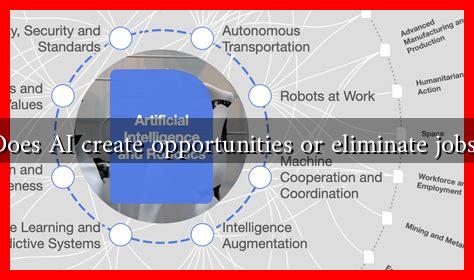-
Table of Contents
Does AI Create Opportunities or Eliminate Jobs?
The advent of artificial intelligence (AI) has sparked a heated debate about its impact on the job market. While some argue that AI will lead to widespread job losses, others believe it will create new opportunities and enhance existing roles. This article explores both sides of the argument, providing insights into how AI is reshaping the workforce.
The Job Displacement Argument
One of the most significant concerns regarding AI is its potential to displace jobs. Automation and machine learning technologies are increasingly capable of performing tasks traditionally done by humans. This shift raises questions about the future of work in various sectors.
- Manufacturing: Robotics and AI have revolutionized manufacturing processes, leading to increased efficiency but also job losses. For instance, a report by the McKinsey Global Institute estimates that up to 800 million jobs could be displaced by automation by 2030.
- Retail: The rise of e-commerce and AI-driven customer service tools, such as chatbots, has reduced the need for human cashiers and customer service representatives. Companies like Amazon are increasingly relying on automated systems to handle logistics and customer interactions.
- Transportation: The development of self-driving vehicles poses a significant threat to jobs in the transportation sector. According to a study by the American Trucking Association, over 3.5 million truck drivers in the U.S. could be affected by autonomous driving technology.
These examples illustrate the potential for AI to eliminate jobs, particularly in sectors that rely heavily on routine tasks. However, the narrative is not entirely bleak.
The Job Creation Argument
While AI may displace certain jobs, it also has the potential to create new opportunities. As technology evolves, so do the roles that humans play in the workforce. Here are some ways AI is generating new job opportunities:
- AI Development and Maintenance: The demand for AI specialists, data scientists, and machine learning engineers is on the rise. According to the World Economic Forum, 97 million new roles may emerge by 2025, many of which will be in AI-related fields.
- Enhanced Roles: AI can augment human capabilities, allowing workers to focus on more complex tasks. For example, in healthcare, AI tools assist doctors in diagnosing diseases, enabling them to spend more time on patient care.
- New Industries: The growth of AI is giving rise to entirely new industries, such as AI ethics and compliance, which require professionals to navigate the ethical implications of AI technologies.
Case Studies: Real-World Examples
Several companies have successfully integrated AI into their operations while also creating new job opportunities:
- IBM: IBM has invested heavily in AI research and development, leading to the creation of roles in AI ethics, data analysis, and software engineering. The company has also launched initiatives to retrain employees for new roles in the AI landscape.
- Google: Google’s AI initiatives have led to the creation of jobs in various fields, including AI research, product management, and user experience design. The company emphasizes the importance of upskilling its workforce to adapt to technological changes.
Statistics and Projections
According to a report by the World Economic Forum, while 85 million jobs may be displaced by 2025 due to the shift in labor between humans and machines, 97 million new roles could emerge that are more adapted to the new division of labor. This statistic highlights the dual nature of AI’s impact on employment.
Conclusion: A Balanced Perspective
The debate over whether AI creates opportunities or eliminates jobs is complex and multifaceted. While it is undeniable that AI will displace certain jobs, it is equally true that it will create new roles and enhance existing ones. The key to navigating this transition lies in education and retraining. As the workforce adapts to the changing landscape, individuals and organizations must embrace lifelong learning to thrive in an AI-driven world.
In summary, AI presents both challenges and opportunities. By understanding its potential impact on the job market, we can better prepare for the future of work. For more insights on the evolving job landscape, visit World Economic Forum.

